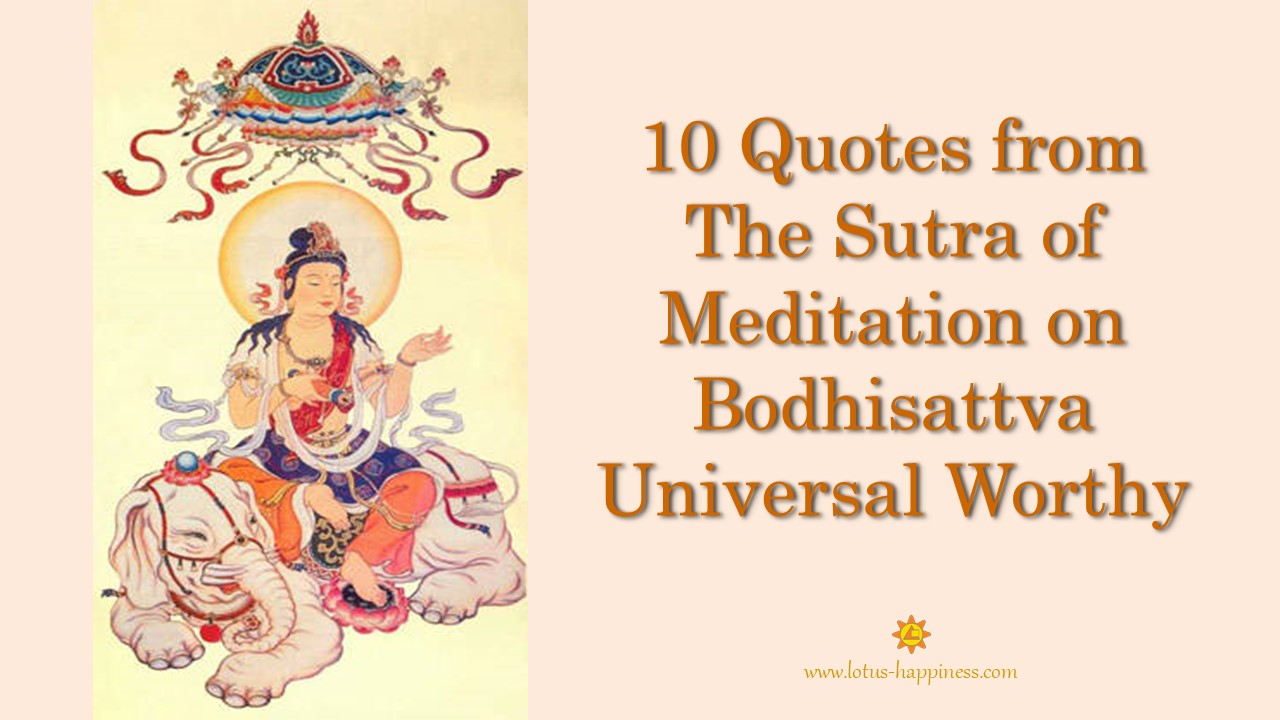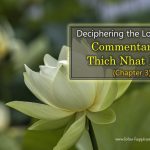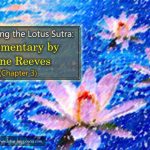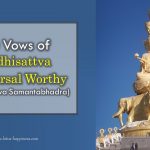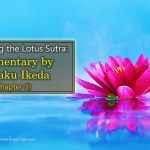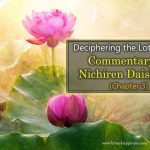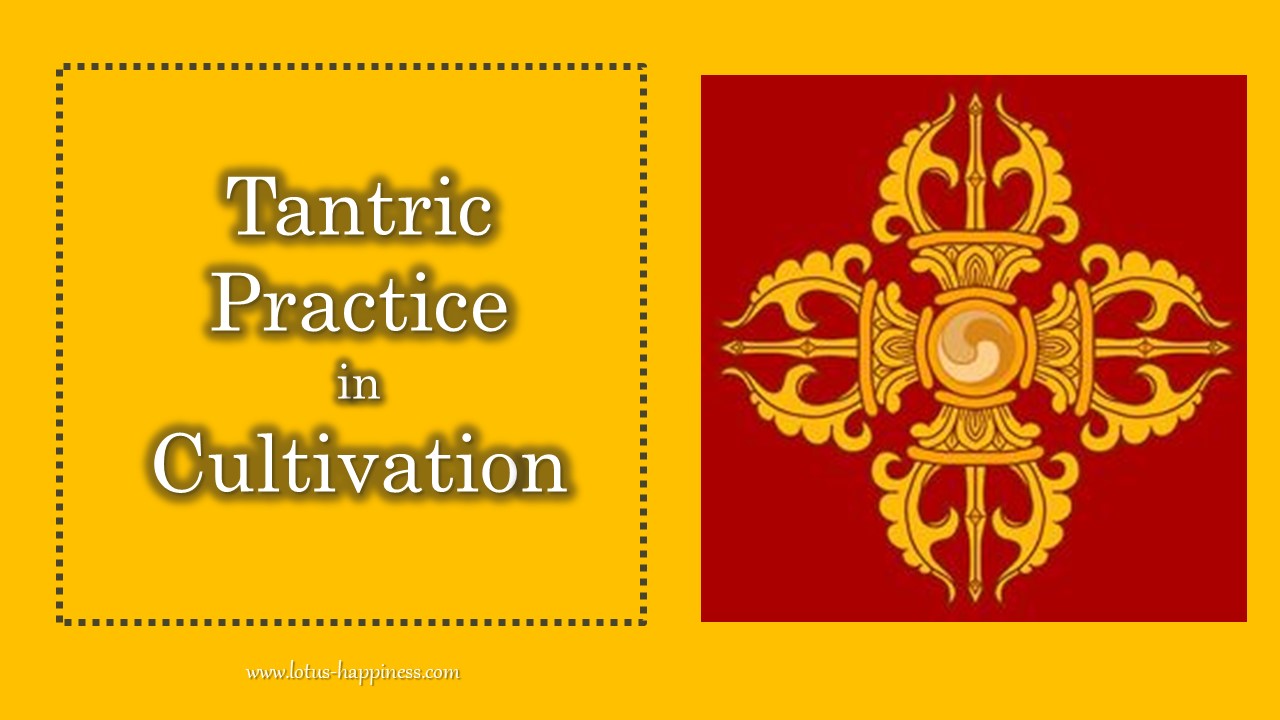10 Quotes from The Sutra of Meditation on Bodhisattva Universal Worthy
The Sutra of Meditation on Bodhisattva Universal Worthy is the closing sutra of the Threefold Lotus Sutra. The essence of this sutra is about purification of one’s life through meditation of the Law of Emptiness – a method of repentance to expiate all past unwholesome karmic impediments.
In this sutra, Bodhisattva Universal Worthy is the protagonist. Typically depicted riding on a six-tusked white elephant, Bodhisattva Universal Worthy is the personification of the Emptiness, a “Pure Form” that is unblemished by any karmic defilement. The sutra provides instruction on how to meditate and visualize the image of Bodhisattva Universal Worthy in order to achieve spiritual oneness with the Law of Emptiness. This method of meditation is a samadhi meditation that enables one to focus upon the true nature of Buddhahood, that is the quality of Emptiness or spiritual purity.
The following are 10 inspirational quotes extracted from The Sutra of Meditation on Bodhisattva Universal Worthy:
Quote #1 – Meditation upon Emptiness is the Method of Repentance
“ ‘The true aspect of reality is that of birthless and deathless. What is sin? What is blessing? My mind is effortlessly empty; sin and blessing have no master. The truth of all realities is that of non-abiding nor decaying. Therefore, you should repent in this manner: meditate upon the mind that has no real mind, understand that reality does not comply with the Law, and perceive that all realities are the truth of emancipation, of nirvana, of tranquility. This method of contemplation is called the Great Repentance, Adorned Repentance, and Sinless Repentance as well as the Annihilation of the Conscious Mind. By practicing repentance in this way, you will achieve purification of your body and mind. Without dwelling in the Law, you will experience freedom like the flowing water. As you continue to constantly focus on these thoughts, you will meet Bodhisattva Universal Worthy and the Buddhas in the ten directions.’(MBUW 7.5)
Quote #2 – The Teaching of Law of Emptiness is for the Bodhisattva
“Thereupon, the Bhagavats will expound the Law of No Aspect for you through the brilliant light of great compassion. You as the practitioner will therefore hear the teaching of the Foremost Principle of Emptiness. Having heard the teaching without fear, you will immediately attain the status of bodhisattva.” (MBUW 7.6)
Quote #3 – Meditate upon the Law of Emptiness to Expiate all Unwholesome Karma
“After the parinirvana of the Buddha, if there are any of the Buddha’s disciples who adhere to the Buddha-words by practicing this repentance, you should know that these people are carrying out the actions of Universal Worthy. Those who carry out the practices of Universal Worthy will not encounter any malicious manifestations or experience any evil retributions. If there are living beings who make obeisance to the Buddhas in the ten directions six times every day and night, recite the Great Vehicle sutra, and ponder upon the profound Law of Emptiness of the foremost in meaning and principle, then it only takes the time of a snap of a finger for them to eliminate the sins of birth and death accumulated over hundreds of millions of billions of asamkhya kalpas. (MBUW 9.4)
Quote #4 – Read and Study the Mahayana Sutras
The Buddha spoke to Ananda: “I, along with the bodhisattvas in the Wise Kalpa and the Buddhas in the ten directions, am able to wipe out the sins of birth and death accumulated over hundreds of millions of billions of asamkhya kalpas as a result of pondering the true meaning of the Great Vehicle. As a consequence of practicing the supremely wonderful method of repentance, each of us has been able to become Buddhas in the ten directions. If you wish to quickly attain Supreme Perfect Enlightenment or if you wish to meet Bodhisattva Universal Worthy and the Buddhas in the ten directions in your present lifetime, then you should read, recite, and ponder the meaning of the Great Vehicle in a secluded place. This should be done after you have taken a shower to purify yourself, donned clean attire, and burnt outstanding incense.” (MBUW 9.2)
Quote #5 – Connect the Minds with the Wisdom of Emptiness to Achieve Purification of Life
“O people of wisdom! Therefore, if there are shravakas who fail to observe the three precepts, five precepts, eight precepts, the precepts of a monk, the precepts of a nun, the precepts of a novice monk, the precepts of a novice nun, the precepts of a shikshamana, or various rules of dignified conduct out of ignorance, ill-will, or malice, if they wish to eradicate these sins and return to the ways of a monk who observes the rules of shramana, then they should diligently read and practice this equal and impartial sutra, ponder the profound Law of Emptiness―the foremost in meaning―in order to connect their minds with the wisdom of emptiness. You should know that these people will completely eliminate all their sins and transgressions forever through every instant of their meditative thoughts. This practice is called Mastering the Rules of Shramana and Perfection in the Mastery of Dignified Conduct. These people are worthy of receiving offerings from all heavenly gods and humans. (MBUW 9.11)
Quote #6 – First Method of Repentance: Meditation of the Law of Emptiness
The Buddha said: “What are the methods of repentance for Kshatriyas and ordinary citizens? People who carry out the methods of repentance should maintain an honest mind, refrain from slandering the Three Treasures, and refrain from causing harm or making it difficult for those who carry out Brahma practices. Rather, they should focus their minds on practicing the six methods of thought and making offerings to support those who embrace the Great Vehicle. Instead of performing any acts of worship, they should meditate upon the profound Law of Emptiness of the foremost in meaning. People who practice these methods are carrying out the First Method of Repentance for Kshatriyas and Ordinary Citizens. (MBUW 9.14)
Quote #7 – Second Method of Repentance: Filial Piety toward Parents, Teachers, and Elders
“People who carry out the second act of repentance should practice filial piety toward their father and mother, as well as be respectful toward their teachers and seniors. This is known as the Second Method of Repentance. (MBUW 9.15)
Quote #8 – Third Method of Repentance: Use the Correct Law to Govern a Country to Prevent the Oppression of People
“People who carry out the third act of repentance should adopt the True Law in governing the country so as to prevent the oppression of people. This is known as the Third Method of Repentance. (MBUW 9.16)
Quote #9 – Fourth Method of Repentance: Six No-Killing Days
“People who carry out the fourth act of repentance should, within their powers of sovereignty or authority, decree six days of purification in which no acts of killing are allowed. This practice is known as the Fourth Method of Repentance. (MBUW 9.17)
Quote #10 – Fifth Method of Repentance: Deep Faith in the Law of Cause and Effect, the Dharma of Buddhahood, and the Truth of the Eternal Buddha
“People who carry out the fifth act of repentance should have deep faith in the Law of Cause and Effect, believe in the Way of One Single Truth, and understand that the Buddha is eternal without ever entering parinirvana. This is known as the Fifth Method of Repentance.” (MBUW 9.18)

